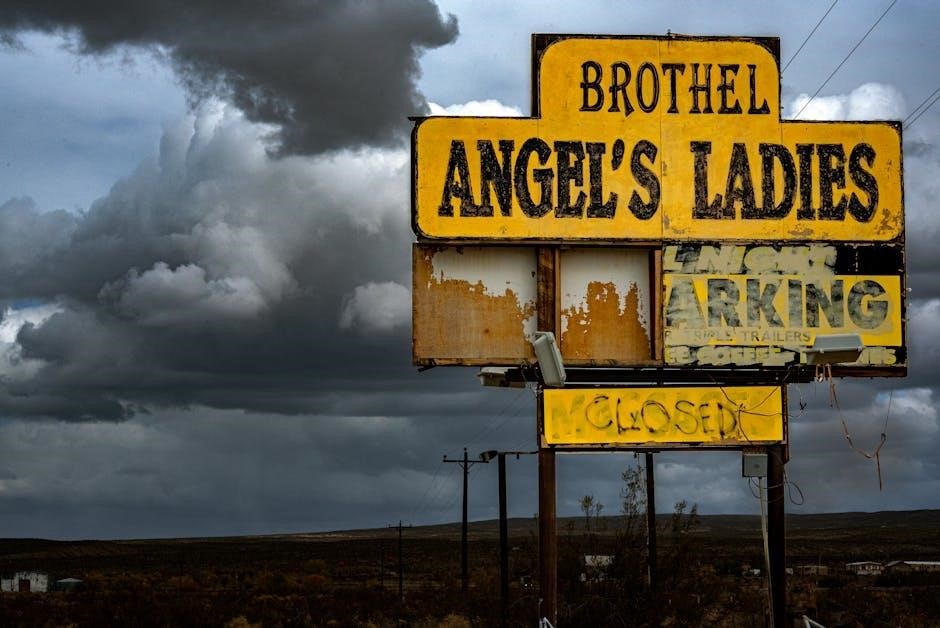Tony Kushner’s Angels in America: Perestroika is the second part of his monumental two-play epic‚ exploring themes of AIDS‚ politics‚ and identity in 1980s America. Available as a PDF‚ this play continues the story of characters introduced in Millennium Approaches‚ delving into their struggles‚ faith‚ and redemption. Its surreal elements and visionary storytelling have made it a landmark of contemporary theatre‚ earning widespread acclaim for its emotional depth and historical relevance.
1.1 Overview of the Play
Angels in America: Perestroika‚ the second part of Tony Kushner’s groundbreaking play‚ is a sweeping narrative that continues the story of the characters introduced in Millennium Approaches. Set against the backdrop of 1980s America‚ the play delves into the interwoven lives of individuals grappling with the AIDS crisis‚ political upheaval‚ and personal identity. First premiered in November 1991 at the Eureka Theatre Company in San Francisco‚ Perestroika expands on the themes of love‚ justice‚ and redemption‚ offering a deeply emotional and intellectually stimulating exploration of human existence.
The play’s title‚ Perestroika‚ refers to the Soviet policy of reform‚ symbolizing the transformative changes occurring both in the characters’ lives and the broader societal landscape. Through a blend of realism and surrealism‚ Kushner examines the spiritual and political dimensions of his characters’ struggles. The narrative is enriched by dream sequences‚ celestial apparitions‚ and philosophical debates‚ creating a unique theatrical experience that bridges the earthly and the divine.
Central to the play is the ongoing story of characters like Prior Walter‚ a man living with AIDS‚ and his lover Louis Ironson‚ who grapples with guilt and abandonment. Meanwhile‚ the enigmatic figure of Roy Cohn‚ a conservative lawyer and closeted homosexual‚ confronts his own mortality and moral failings. The play also introduces new characters‚ such as the enigmatic Angel of America‚ who embodies both divine judgment and compassion.

Perestroika is celebrated for its ambitious scope and lyrical prose‚ offering a profound meditation on the interplay between history‚ identity‚ and spirituality. Its availability as a PDF has made it accessible to a wide audience‚ ensuring its influence endures in both academic and theatrical contexts. As the conclusion to Kushner’s epic work‚ Perestroika leaves a lasting impression‚ challenging viewers to reflect on the fragility of life‚ the power of forgiveness‚ and the enduring hope for human connection.

1.2 Significance of Perestroika

Angels in America: Perestroika holds profound significance as the culmination of Tony Kushner’s two-part epic‚ offering a deeply moving and intellectually stimulating conclusion to the story begun in Millennium Approaches. The play’s title‚ derived from the Soviet term for political and social reform‚ reflects its themes of transformation‚ redemption‚ and the collapse of old orders. By weaving together personal narratives with broader societal shifts‚ Kushner crafts a work that transcends traditional theatrical boundaries‚ blending the intimate with the cosmic.
The play’s exploration of the AIDS crisis‚ set against the backdrop of Reagan-era America‚ provides a searing critique of political negligence and societal indifference. Through characters like Prior Walter and Roy Cohn‚ Kushner humanizes the epidemic‚ revealing the emotional and moral complexities of those affected. At the same time‚ the play’s surreal elements‚ such as the appearance of the Angel of America‚ elevate the story to a metaphysical plane‚ exploring themes of faith‚ justice‚ and the search for meaning in a fractured world.
Perestroika is also notable for its innovative storytelling and theatrical ambition‚ challenging conventions of dramatic structure and narrative. Kushner’s use of dream sequences‚ multiple realities‚ and symbolic imagery creates a rich‚ layered text that rewards both performance and analysis. The play’s availability as a PDF has further cemented its influence‚ making it accessible to scholars‚ students‚ and theatre enthusiasts worldwide.
Ultimately‚ the significance of Perestroika lies in its ability to balance the personal and the political‚ the earthly and the divine. It is a testament to the power of theatre to confront societal crises‚ challenge moral complacency‚ and inspire hope in the face of adversity; Kushner’s work remains a defining achievement in American drama‚ ensuring Perestroika’s enduring relevance and impact.

The Playwright: Tony Kushner
Tony Kushner is a Pulitzer Prize-winning playwright and one of the most influential voices in contemporary American theatre. Born in 1956 in New York City‚ Kushner’s work often explores themes of politics‚ history‚ and sexuality. His plays‚ including Angels in America‚ are celebrated for their intellectual depth and emotional power. Kushner’s writing blends the personal and the political‚ offering profound insights into human struggle and societal transformation. His work continues to shape theatrical and cultural discourse globally.
2.1 Background and Contributions
Tony Kushner‚ born in 1956 in New York City‚ is one of the most influential playwrights of his generation. His work is deeply rooted in political and social issues‚ often blending historical context with personal narratives. Kushner’s early life was marked by a strong connection to the arts‚ encouraged by his family‚ which fostered his passion for storytelling and theatre. He attended Columbia University and later earned an MFA in playwrighting from New York University.

Kushner’s rise to prominence began in the late 1980s‚ but it was Angels in America that solidified his reputation as a visionary playwright. The play‚ which premiered in 1991‚ explores themes of identity‚ politics‚ and the AIDS crisis during the 1980s. Its success led to widespread critical acclaim and numerous awards‚ including the Pulitzer Prize for Drama in 1993. Kushner’s ability to weave together personal and political narratives has made his work both deeply human and intellectually challenging.

Throughout his career‚ Kushner has been a vocal advocate for LGBTQ+ rights and social justice. His plays often challenge societal norms and provoke audiences to think critically about the world around them. In addition to Angels in America‚ Kushner has written other notable works‚ such as Caroline‚ or Change and The Intelligent Homosexual’s Guide to Capitalism and Socialism with a Key to the Scriptures. His contributions to theatre have left an indelible mark on the medium‚ inspiring a new generation of playwrights and audiences alike.
Kushner’s influence extends beyond the stage. He has also written screenplays‚ including the Academy Award-winning film Lincoln‚ directed by Steven Spielberg. His ability to adapt his storytelling skills to different mediums has further cemented his legacy as a master of contemporary storytelling.

Themes and Symbolism
Angels in America: Perestroika delves into themes of identity‚ faith‚ politics‚ and redemption‚ set against the backdrop of the AIDS crisis in 1980s America. The play uses surreal imagery and symbolism‚ with the Angel of America representing divine judgment and transformation. Kushner explores the clash between personal and political struggles‚ weaving together historical and metaphysical elements to create a powerful narrative of human resilience and moral reckoning.
3.1 Exploration of AIDS

Tony Kushner’s Angels in America: Perestroika profoundly explores the AIDS crisis‚ a central theme of the play. Set in the mid-1980s‚ the work captures the devastating impact of the disease on individuals and society. Through characters like Prior Walter‚ a young gay man struggling with AIDS‚ Kushner examines the physical‚ emotional‚ and existential toll of the illness. The play also delves into the stigma and fear surrounding AIDS‚ reflecting the era’s lack of understanding and political indifference.
Kushner uses surreal and visionary sequences to portray the psychological and spiritual struggles of those living with AIDS. Prior’s encounters with the Angel of America symbolize his search for meaning and divine justice in the face of suffering. Meanwhile‚ the character of Roy Cohn‚ a closeted lawyer and political figure‚ embodies the hypocrisy and denial that exacerbated the crisis. His own battle with AIDS serves as a stark contrast to his public persona‚ highlighting the moral decay of Reagan-era politics.

The play critiques the societal neglect of marginalized communities‚ particularly gay men‚ during the AIDS epidemic. Kushner’s portrayal of the healthcare system’s failures and the lack of governmental response underscores the human cost of political inaction. At the same time‚ the play offers a message of resilience and hope‚ as characters like Prior find strength in their identities and relationships.
Through its exploration of AIDS‚ Perestroika not only reflects the historical context of the 1980s but also resonates with contemporary discussions about health‚ identity‚ and social justice. Kushner’s work remains a powerful testament to the lives lost and the struggles endured during one of the darkest periods of the epidemic.




Leave a Reply
You must be logged in to post a comment.